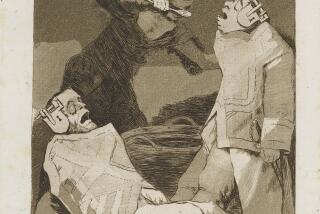Dominant Species : As mutilation of endangered brown pelicans rises, one wonders what would prompt someone to brutalize the birds.
- Share via
Don’t tell my boyfriend, but for years I’ve been in love with Carl Sagan.
It started when I first saw him stare wondrously into the camera on “Cosmos,” the acclaimed book and PBS television series about where mankind is in the vastness of space and time.
Dressed in a turtleneck and professorial-looking corduroy pants, Sagan could make distant universes seem as close and real as the petunias in my neighbor’s yard. Every time he said “billions and billions of stars,” it sent shivers up my spine.
Of course, listening to his cosmic ruminations once a week and having to pick up his earthly dirty socks every day are two very different things. But that’s the beauty of fantasy relationships. No laundry.
Fantasy or not, though, I still waited until my boyfriend was gone last weekend to curl up with an excerpt of Sagan’s newest book, due out this week, called “Shadows of Forgotten Ancestors.” (OK, so his wife, Ann Druyan, helped write it too.) This time it’s not space that Sagan ponders, but the nature of inhabitants here on Earth: What does it mean to be human? What makes us different from other animals?
“We humans are the dominant species on the planet,” the authors write. “Why us?”
After listing the traits that philosophers and scientists have for centuries offered as being uniquely human--that only man possesses language, uses tools and has morality--Sagan and Druyan then proceed to make quick work of shooting those reasons down.
They describe the tool-making abilities of chimpanzees to draw termites out of the ground; the language skills of chimpanzees able to type their requests, emotions and comments on a keyboard, and, perhaps most significant of all, the morality of macaque monkeys that preferred to starve rather than pull a rope that would provide food but simultaneously send an electric shock to an unrelated monkey.
“If the circumstances were reversed, and captive humans were offered the same deal by macaque scientists,” Sagan wonders, “would we do as well?”
I was still pondering that question when I opened the newspaper a few days later and saw a story that seemed to have hands that reached around my throat. It was about the rise in brutal, horrifying cases of mutilation against California brown pelicans, which were placed on the endangered species list in 1970.
About a half-dozen birds have been found with their beaks sawed off in Ventura, Redondo Beach, Marina del Rey and Dana Point this past summer. One bird in Newport Beach was crucified to a light pole. An accusatory finger has been pointed at fishermen.
“In El Nino years, when there isn’t a lot of prey around, there is more competition (for food),” Trudy Ingram, director of the sea bird monitoring program at Channel Islands National Park, said. The only place in the United States where pelicans nest is on Anacapa Island.
“More birds are going after baited hooks,” she said.
Ingram, as many others, is at a loss to explain what would prompt someone to brutalize the birds. But the words of one fisherman, who was arrested after two young brothers saw him ripping a hook out of a pelican’s pouch, offered a clue.
“That hook’s worth more than that pelican,” the fisherman reportedly said.
A hook worth more than a bird? Economic considerations over an endangered species? The words echoed in my head. I had heard them before.
Wasn’t that precisely the sentiment expressed by President Bush two weeks ago in the Pacific Northwest when he said he would refuse to sign an extension of the 19-year-old Endangered Species Act, unless Congress rewrote it to allow economic considerations to override the preservation of species?
Or did I misunderstand him when he stood in front of a truck filled with timber and said, “It’s time to make people more important than owls?”
I don’t think I misunderstood him. Once again, man, like the 500-pound gorilla, is encouraged to sit wherever he wants. And if 100 species every day become extinct because of that attitude, what is that compared to jobs?
We need only look as far as our own back yard to see where that kind of thinking leads. Last week, visitors to Channel Islands National Park were invited to “A Wake for the Abalone Steak,” a program about a species off our coast that has been practically decimated by a combination of over-harvesting and disease. Only 2% of the population of six years ago remains, a park spokeswoman said.
But hey, those fishermen have a job to do, don’t they? And who’s more important anyway--a guy trying to feed his family or a lowly abalone?
Carl Sagan writes eloquently about man’s place in the animal kingdom. He also has the extraordinary gift for opening our eyes to worlds we didn’t know existed and consequences we might not have considered.
But the book will do nothing unless the readers who need it most obtain a copy.
And believe me, the readers who need it most certainly aren’t the macaque monkeys.
More to Read
Sign up for our Book Club newsletter
Get the latest news, events and more from the Los Angeles Times Book Club, and help us get L.A. reading and talking.
You may occasionally receive promotional content from the Los Angeles Times.










